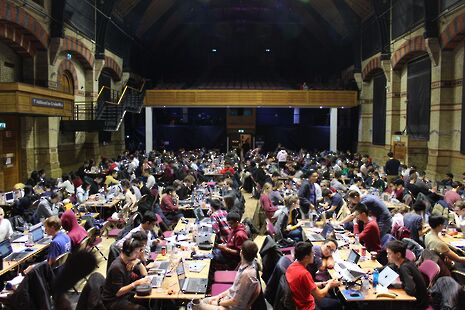Meeting the hackers of the future
Reporting from the University of Cambridge’s annual hackathon, Science Editors Zak Lakota-Baldwin and Marco Oechsner find a wealth of creative projects produced by a diverse group of students

What comes to mind when you picture a hacker? For many of us, the stereotypical image is of a pallid, hoodie-clad teenage boy, breaching Facebook’s inner walls and leaking sensitive information from the safety of his basement. Spend a few minutes talking to any of the boundlessly inventive and enthusiastic students at Hack Cambridge, the University’s 24-hour hackathon, and you would come away with an entirely different impression.
The event, which took place at the Cambridge Corn Exchange and Guildhall over the weekend of January 19th and 20th, brought together hundreds of brilliant young hackers from universities around the world. They collaborated and innovated, using their hacking skills not, as the name may suggest, to tear down firewalls, but to build something new. The core idea is at once simple and thrilling – in the 24 hours allotted, the hackers are challenged with putting together an original, exciting creation, be it a piece of software or hardware. When the dust settles, the big name sponsors and judges (among them representatives from Microsoft and Amazon) award prizes to their favourites, and the hacking efforts of all are celebrated.
Varsity spoke to Timothy Lazarus, a third year CompSci at St. John’s and the General Manager of Hack Cambridge, about the history and ethos of the event. Now in its fourth iteration, it shares many of the features of the famous US hackathons that inspired it, but has come to stand out in one crucial way – rather than operating a simple sign-up system, it has a selective application process, and uses a sophisticated algorithm to ensure a diverse mix of participants.
“It was striking to see what a broad range of problems they had applied themselves to, and how ingeniously they had solved them”
Lazarus explained: “In the first year, we didn’t develop this complex algorithm, and the male to female ratio was just way too high.” He added that the focus on improving representation at the hackathon came from a desire for people to appreciate that “anyone can hack, irrespective of your background – if you’re given the opportunity to make something amazing, you will.”
The hackers, unsurprisingly, did not disappoint. Speaking to the cheerfully exhausted teams, many of whom had barely managed an hour’s sleep between them in their creative frenzy, it was striking to see what a broad range of problems they had applied themselves to, and how ingeniously they had solved them.
One team designed an app capable of using camera technology to detect a fall induced by a stroke, which would then notify the friends and family of the stroke victim with a video of the fall and give them the opportunity to immediately alert emergency services. Another team, seeking to combat fake news and media bias, devised an extension to Google Chrome which records and assesses the articles that a user reads in order to build up a personalised political spectrum and recommend alternative sources for a more balanced view.
The great diversity at Hack Cambridge was apparent not just in gender, but also in geographical distribution. One particularly diverse team included students from Germany, Canada and Egypt, who found common ground in their frustration at what they perceived to be a lack of any suitable note-taking apps, and rectified this by simply designing one themselves.
To appreciate what a truly global phenomenon hackathons are set to become, take the example of Major League Hacking (MLH). An American company which has now spread to Europe, it provides support for hackathons (including Hack Cambridge) in the form of hardware, promotion, sponsor contacts and financial backing. In 2013, the year of its foundation, MLH helped to facilitate five events in North America – now it supports over 250 across two continents, and looks set to expand ever further.
The future of hacking is bright, and as the world continues to present us with novel challenges, it seems more important than ever that we seek to find ways to apply technology and human ingenuity in a constructive manner. Hackathons such as Hack Cambridge represent a unique opportunity for young people to try things out in an inspiring and empowering environment, where for 24 hours anything is possible.
 News / Judge Business School advisor resigns over Epstein and Andrew links18 February 2026
News / Judge Business School advisor resigns over Epstein and Andrew links18 February 2026 News / Gov grants £36m to Cambridge supercomputer17 February 2026
News / Gov grants £36m to Cambridge supercomputer17 February 2026 News / Union speakers condemn ‘hateful’ Katie Hopkins speech14 February 2026
News / Union speakers condemn ‘hateful’ Katie Hopkins speech14 February 2026 News / CUCA members attend Reform rally in London20 February 2026
News / CUCA members attend Reform rally in London20 February 2026 News / Hundreds of Cambridge academics demand vote on fate of vet course20 February 2026
News / Hundreds of Cambridge academics demand vote on fate of vet course20 February 2026










